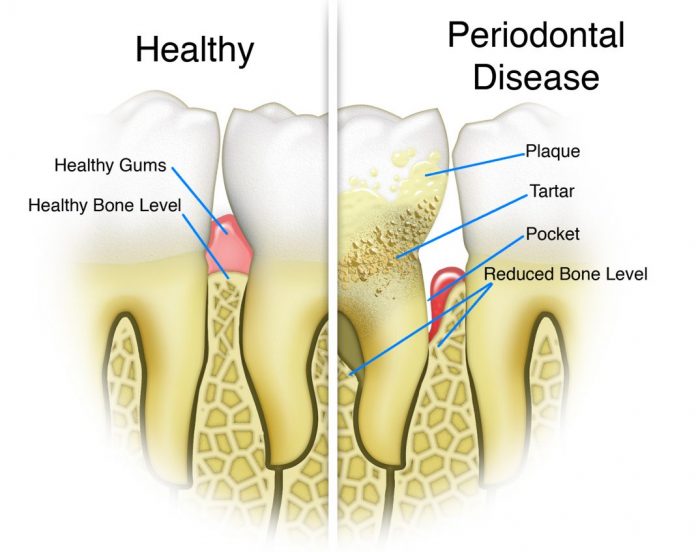Periodontitis, a severe form of periodontal disease involves inflammation of the gums and other structures that support the teeth, is caused by bacteria found in dental plaque that develops just below the gum line, in the area called the sulcus or periodontal pocket, where it causes the attachment of the tooth and its supporting tissues to break down.
In trying to eliminate the bacterial infection, our body produces substances that destroy the structures that hold the teeth in the jaw, including the periodontal ligament and underlying bone. As this process continues, the teeth become loose. Pockets form between the teeth and gums, allowing more bacteria to accumulate. Left untreated, periodontitis can result in tooth loss. People who smoke are four to seven times more likely than nonsmokers to get periodontitis. Smoking may impair the body’s defense against bacteria.
WARNING SIGNS
• Pain in the mouth
• Gums bleed when brushing
• Spaces develop between teeth
• Swollen and tender gums
• Receding gums (exposing the bottom of your teeth)
• Persistent bad breath
• An unpleasant taste in the mouth
• Pus between teeth and gums
RISK FACTORS
• Tobacco use
• Use of certain types of medicine
• Bridges that no longer fit
• Crooked teeth
• Fillings that have become defective
• Pregnancy
• Oral cancer
Prevention
Daily brushing and flossing (morning and night) and regular visits for professional cleaning can help prevent periodontitis or allow you to have it treated during its earliest stages. If you smoke, quitting will reduce your risk significantly.
Treatment
Periiodontists classify the disease as mild, moderate or severe.
Mild periodontitis is usually treated first with a thorough cleaning called scaling and root planing. Scaling removes plaque or calculus that has accumulated on the teeth. Root planing has two purposes: 1) to remove plaque or calculus from the roots of the teeth and 2) to smooth the roots of the teeth, making it more difficult for bacteria to cling to them.
Moderate periodontitis may additionally require surgical treatment for reshaping the gums to fit the teeth (resective surgeries) or encouraging lost bone to regrow (regenerative surgeries). Severe periodontitis likely will require surgical intervention and, in some instances, antibiotics.
The outlook is good if the disease is recognized early and treated aggressively. Once bone loss occurs, the prognosis depends on the severity of the loss. The best course of action is to get regular dental checkups. If you have persistent bleeding or swelling of your gums or notice loose teeth, call your dentist.
Dr. Akanksha Ostwal
Periodontist/ General Dentist
Bahrain Specialist Hospital
Email: akanksha.ostwal@bsh.com.bh


